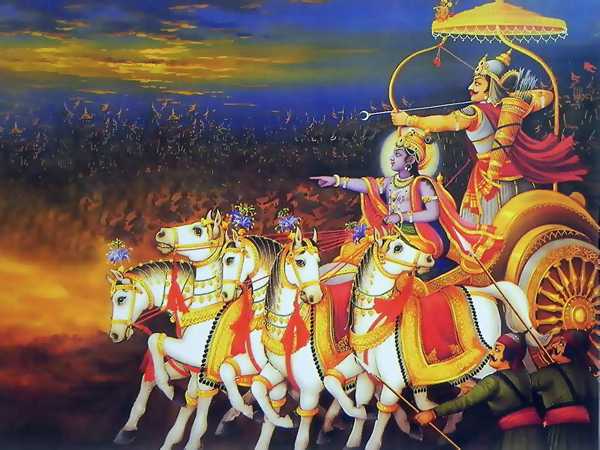Chapter 42

Janamejaya said, “Why is the current of (the tirtha known by the name of)Vasishthapavaha so rapid? For what reason did the foremost of rivers bearaway Vasishtha? What, O lord, was the cause of the dispute betweenVasishtha and Vishvamitra? Questioned by me, O thou of great wisdom, tellme all this! I am never satiated with hearing thee!”
Vaishampayana said, “A great enmity arose between Vishvamitra andVasishtha, O Bharata, due to their rivalry in respect of asceticausterities. The high abode of Vasishtha was in the tirtha called Sthanuon the eastern bank of the Sarasvati. On the opposite bank was the asylumof the intelligent Vishvamitra. There, in that tirtha, O monarch, Sthanu(Mahadeva) had practised the austerest penances. Sages still speak ofthose fierce feats. Having performed a sacrifice there and worshipped theriver Sarasvati, Sthanu established that tirtha there. Hence it is knownby the name Sthanu-tirtha, O lord. In that tirtha, the celestials had, indays of yore, O king, installed Skanda, that slayer of the enemies of thegods, in the supreme command of their army. Unto that tirtha of theSarasvati, the great Rishi Vishvamitra, by the aid of his austerepenances, brought Vasishtha. Listen to that history. The two asceticsVishvamitra and Vasishtha, O Bharata, every day challenged each othervery earnestly in respect of the superiority of their penances. The greatMuni Vishvamitra, burning (with jealousy) at sight of the energy ofVasishtha, began to reflect on the matter. Though devoted to theperformance of his duties, this, however, is the resolution, O Bharata,that he formed: ‘This Sarasvati shall quickly bring, by force of hercurrent, that foremost of ascetics, Vasishtha, to my presence. After heshall have been brought hither, I shall, without doubt, slay thatforemost of regenerate ones.’ Having settled this, the illustrious andgreat Rishi Vishvamitra with eyes red in wrath, thought of that foremostof rivers. Thus remembered by the ascetic, she became exceedinglyagitated. The fair lady, however, repaired to that Rishi of great energyand great wrath. Pale and trembling, Sarasvati, with joined handsappeared before that foremost of sages. Indeed, the lady was muchafflicted with grief, even like a woman who has lost her mighty lord. Andshe said unto that best of sages, ‘Tell me what is there that I shall dofor thee.’ Filled with rage, the ascetic said unto her, ‘Bring hitherVasishtha without delay, so that I may slay him.’ Hearing these words theriver became agitated. With joined hands the lotus-eyed lady began totremble exceedingly in fear like a creeper shaken by the wind. Beholdingthe great river in that plight, the ascetic said unto her, ‘Without anyscruple, bring Vasishtha unto my presence!’ Hearing these words of his,and knowing the evil he intended to do, and acquainted also with theprowess of Vasishtha that was unrivalled on earth, she repaired toVasishtha and informed him of what the intelligent Vishvamitra had saidunto her. Fearing the curse of both, she trembled repeatedly. Indeed, herheart was on the grievous curse (that either of them might pronounce onher). She stood in terror of both. Seeing her pale and plunged inanxiety, the righteous-souled Vasishtha, that foremost of men, O king,said these words unto her.
“Vasishtha said, ‘O foremost of rivers, save thyself! O thou of rapidcurrent, bear me away, otherwise Vishvamitra will curse thee. Do not feelany scruple.’ Hearing these words of that compassionate Rishi, the riverbegan to think, O Kauravya, as to what course would be best for her tofollow. Even these were the thoughts that arose in her mind: ‘Vasishthashoweth great compassion for me. It is proper for me that I should servehim.’ Beholding then that best of Rishis, (Vasishtha) engaged in silentrecitation (of mantras) on her bank, and seeing Kusika’s son(Vishvamitra) also engaged in homa, Sarasvati thought, ‘Even this is myopportunity.’ Then that foremost of rivers, by her current, washed awayone of her banks. In washing away that bank, she bore Vasishtha away.While being borne away, O king, Vasishtha praised the river in thesewords: ‘From the Grandsire’s (manasa) lake thou hast taken thy rise, OSarasvati! This whole universe is filled with thy excellent waters!Wending through the firmament, O goddess, thou impartest thy waters tothe clouds! All the waters are thee! Through thee we exercise ourthinking faculties! Thou art Pushti and Dyuti, Kirti, and Siddhi and Uma!Thou art Speech, and thou art Svaha! This whole universe is dependent onthee! It is thou that dwellest in all creatures, in four forms!’ Thuspraised by that great Rishi, Sarasvati, O king, speedily bore thatBrahmana towards the asylum of Vishvamitra and repeatedly representedunto the latter the arrival of the former. Beholding Vasishtha thusbrought before him by Sarasvati, Vishvamitra, filled with rage, began tolook for a weapon wherewith to slay that brahmana. Seeing him filled withwrath, the river from fear of (witnessing and aiding in) a brahmana’sslaughter, quickly bore Vasishtha away to her eastern bank once more. Shethus obeyed the words of both, although she deceived the son of Gadhi byher act. Seeing that best of Rishis, Vasishtha, borne away, thevindictive Vishvamitra, filled with wrath, addressed Sarasvati. saying,’Since, O foremost of rivers, thou hast gone away, having deceived me,let thy current be changed into blood that is acceptable to Rakshasas.’Then, cursed by the intelligent Vishvamitra, Sarasvati flowed for a wholeyear, bearing blood mixed with water. The gods, the Gandharvas, and theApsaras, beholding the Sarasvati reduced to that plight, became filledwith great sorrow. For this reason, O king, the tirtha came to be calledVasishthapravaha on earth. The foremost of rivers, however, once more gotback her own proper condition.”




